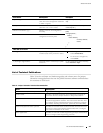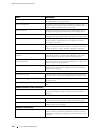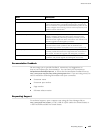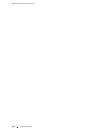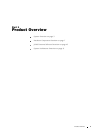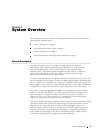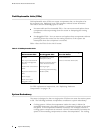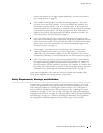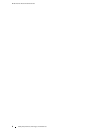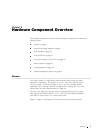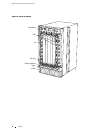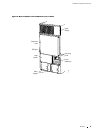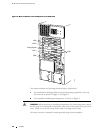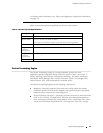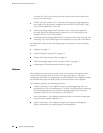
System Overview
system can function at the higher speed indefinitely. For more information,
see Cooling System on page 39.
Host module (Routing Engine and MCS functioning together)—The router
can have one or two host modules. If two host modules are installed, one
(the master) is active and the other is in standby mode. If the master host
module (or either of its components) is removed from the chassis, the standby
host module becomes active. The Routing Engine and MCS must reside in
adjacent slots and be fully operational for the host module to f unction. For
more information, see Host Module on page 22.
PCG—The router has two PCGs. Both PCGs send their clock signals to the
other Packet F orwarding Engine components, along with a signal that indicates
which clock is the master. If one PCG fails, the other PCG becomes the master
system clock. For more information, see “Packet Forwarding Engine Clock
Generators (PCGs)” on page 18.
Power supply—The router has two load-sharing, fully redundant power
supplies to distribute DC power to the other components. If one power
supply fails, the second power supply can provide full power to the router’s
components indefinitely. For more information, see Power System on page 35.
SFM—The router can have up to four interconnected SFMs. If one SFM fails,
the switching and forwarding functions of the failed module are distributed
among the remaining SFMs. Total bandwidth is reduced by 1/n ,wheren is
the total number of SFMs installed in the router. For example, in a system with
four S FMs, each SFM provides one-fourth of the forwarding capacity. For more
information, see “Switching and Forwarding Module (SFM)” on page 19.
In the base configuration, the router has one host module and multiple S FMs,
PCGs, p ower supplies, and cooling system components.
Safety Requirements, Warnings, and Guidelines
To avoid harm to yourself or the router as you install and maintain it, you need
to follow the guidelines for working with and near electrical equipment, as well
as the safety procedures for working with Internet routers. For a discussion of
how to make the installation site a safe environment, see “Preparing for Router
Installation” on page 59. For a list of safety warnings, see “Safety and Regulatory
Compliance Information” on page 221 and particularly “Electrical Safety Guidelines
and Warnings” on page 227. However, pro viding an exhaustive set of guidelines
for working with electrical equipment is beyond the scope of this manual.
Safety Requirements, Warnings, and Guidelines 5



